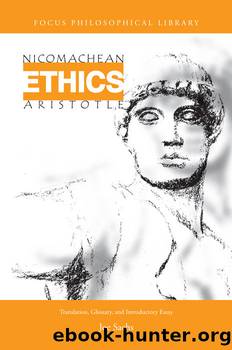Nicomachean Ethics (Focus Philosophical Library) by Aristotle

Author:Aristotle
Language: eng
Format: mobi
Publisher: Hackett Publishing Company, Inc.
Published: 2012-07-16T03:00:00+00:00
BOOK VI
Chapter 1. Now since what we said earlier is that one ought to choose the mean, and not the excess or deficiency, and [20] the mean is as right reason says, let us explicate this. For in all the active conditions of the soul described, as also with all others, there is some target to which the one who has a rational understanding looks off as he tightens or loosens his grip, and there is some boundary marking the mean conditions which we claim are between an excess and a deficiency, a boundary in accord with right reason. But while speaking this way is truthful, there is nothing clear in it, for in all other pursuits about which there is knowledge it is true to say this, that one ought not to bear down or let up too much or too little, but the mean amounts and according to right reason. But having this understanding alone, [30] one would know nothing more, as if someone were to say that one ought to apply to the body whatever the medical art calls for and in the way the one who has it says. Hence it is necessary in connection with the active conditions of the soul as well, not only that this be said truly, but also that it be determined what the right understanding is and what defines this.
Now we claim that the virtues of the soul are distinguished into those [1139A] that belong to character and those that belong to thinking. We have gone through what concerns the virtues of character, but in connection with the rest, let us discuss them after speaking first about the soul. Now it was said before that there are two parts of the soul,141 the part that has reason and the irrational part, but now one must make a division in the same way concerning the part that has reason. Let two parts that have reason be assumed, one part by which we contemplate the sorts of beings of which the governing principles are incapable of being other than they are, and one part by which we contemplate things capable of being otherwise; for in relation to things different in kind, that which, among the parts of the soul, is by nature related to each, [10] is also different in kind, if recognition is present in the parts of the soul by some sort of likeness and kinship. Let one of these be called the knowing part and the other the calculating part,142 since deliberating and calculating are the same and no one deliberates about things that are incapable of being otherwise, so that what calculates is one particular part of that in the soul which has reason. Therefore, one must grasp the best active condition of each of these parts, since that is the virtue of each, and the virtue of a thing is related to its particular work.
Chapter 2. Now there are three things in the soul that govern action and truth: sense-perception, intellect, and desire.
Download
This site does not store any files on its server. We only index and link to content provided by other sites. Please contact the content providers to delete copyright contents if any and email us, we'll remove relevant links or contents immediately.
The Secret History by Donna Tartt(16635)
The Social Justice Warrior Handbook by Lisa De Pasquale(11490)
Thirteen Reasons Why by Jay Asher(7794)
This Is How You Lose Her by Junot Diaz(5779)
Weapons of Math Destruction by Cathy O'Neil(5040)
Zero to One by Peter Thiel(4829)
The Myth of the Strong Leader by Archie Brown(4792)
Promise Me, Dad by Joe Biden(4451)
Beartown by Fredrik Backman(4423)
Stone's Rules by Roger Stone(4418)
How Democracies Die by Steven Levitsky & Daniel Ziblatt(4403)
The Fire Next Time by James Baldwin(4346)
100 Deadly Skills by Clint Emerson(4082)
A Higher Loyalty: Truth, Lies, and Leadership by James Comey(4035)
Rise and Kill First by Ronen Bergman(4014)
The David Icke Guide to the Global Conspiracy (and how to end it) by David Icke(3885)
The Farm by Tom Rob Smith(3873)
Secrecy World by Jake Bernstein(3786)
The Doomsday Machine by Daniel Ellsberg(3734)
